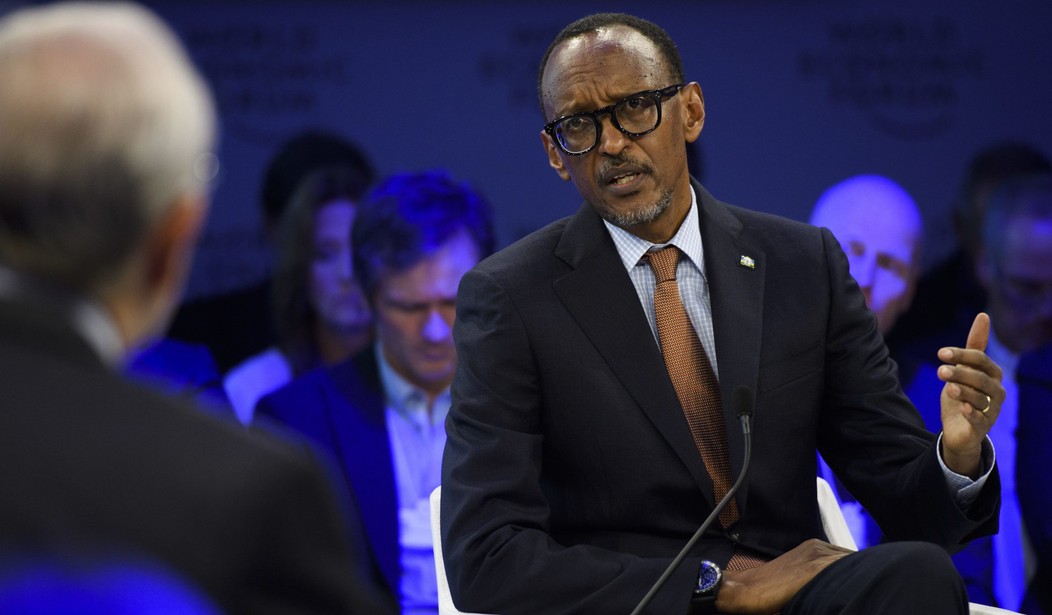WASHINGTON — The first African head of state in history to address the American Israel Public Affairs Committee’s annual policy conference today advocated a joint resolve to fight hateful ideologies that led to the Holocaust and the Rwandan genocide.
Rwanda President Paul Kagame, who welcomed Israeli Prime Minister Benjamin Netanyahu to Kigali last year, declared to a morning assembly of some 19,000 pro-Israel activists at the Washington Convention Center that his country “is without question a friend of Israel.”
Kagame said the “survival and renewal of our two nations” bonds their nations and underscores that “the security of people who have once been targeted for extermination can never be exclusively physical.”
Until the ideologies behind genocide are defeated, he emphasized, “our world is not truly safe – not for us, not for anyone.”
The president called for “renewed solidarity against relentless efforts to deny genocide and trivialize the victims.”
The first Africa-Israel summit is set to take place in Togo this October.
“Israel is engaging in Africa and Africa is responding in a good way; previously, there has been absence of that engagement,” Kagame said.
A 2014 United Nations Security Council vote on Palestinian statehood failed in part because of Rwanda’s abstention.
“For us, the reason for abstaining was …the way [it was] done, the timing, we thought this was going to be prejudicial to other things that need to be addressed,” Kagame explained. “…Our experience in Rwanda is that you cannot simply introduce solutions to people from outside.”
The president said he sees the Rwanda-Israel relationship growing and “driving our future economies” in Africa in the sectors of agriculture, energy, and information and communications technologies.
“When we work together, when we support each other, this can benefit economies across the continent,” he said.
The White House did not announce any meetings with Kagame while the Rwandan leader is in Washington. Kagame told AIPAC “there’s a lot that needs to happen” in the relationship between the United States and Africa, starting with valuing each other and focusing on growing partnerships.
Former British Prime Minister Tony Blair, the onetime special envoy for the Quartet (United Nations, the United States, the European Union and Russia) on the Middle East peace process, told AIPAC this morning that a new approach to the process needs to focus on Israel’s shared common interests with Arab partners in the region.
Blair, who’s returning to Israel week on his 178th visit to the Jewish state since leaving office, stressed that “we’re not going to reach peace in the old way — we need a new way forward.”
The security of Israel is not just an Israeli issue, he noted, but “a global interest for all nations in the world.”
Blair said the key to “transforming the Middle East relationships” involves open, “above the table” discussions and agreements between Israelis and Arab states along with putting a two-state solution “at least on the road to resolution.”
The regional alliances need to focus the regional “transition and struggle” against religious extremism from players such as Iran and the Muslim Brotherhood and promote “rules-based economies.”
Blair said this “new alliance” in the Middle East and its strategic partnerships can be forged “with leadership of the United States of America” — “if we want the Middle East to succeed.”
While security is a foremost concern, the former prime minister acknowledged he wants “this to be more about than security” including an economic focus and “cooperation in civic society as well, so people from Israel and Arab nations are mixing together.”
“If you want a cause for hope in the region, Israel’s a cause for hope,” Blair added.
Israeli Ambassador to the U.S. Ron Dermer hailed the new administration and new UN Ambassador Nikki Haley, who was scheduled to address the conference this evening: “Armed with that moral clarity, we can finally get serious about the UN’s anti-Israel bias,” he said.
“For the first time in many years, perhaps even many decades, there is no daylight between our two governments,” Dermer told AIPAC.
Foremost among challenges for Israel and the U.S. remains Iran, the ambassador said, as “Iran’s appetite for aggression and terror has only grown since that deal was signed.”
He likewise underscored the “rare moment of opportunity to bring Israel and many in the Arab world together” in a “real prospect toward reconciliation.”
Dermer said he’s “confident better days are ahead.”








Join the conversation as a VIP Member